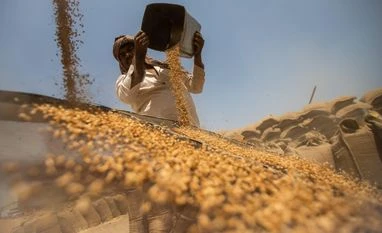Govt proposes to include moisture measurements in cereal grains, oilseeds
The draft rules pertaining to moisture meters were made available for public feedback on May 30, 2024, inviting comments from all stakeholders, by the end of June 2024
)
The amendment aims to incorporate specifications for the moisture meters in measuring moisture levels in cereal grains and oilseeds. Photo: Bloomberg
Listen to This Article
The government has proposed to include moisture meters in the Legal Metrology Rules to measure moisture levels in cereal grains and oilseeds as part of its efforts to bring transparency in agricultural trade practices.
The Department of Consumer Affairs organised a meeting with all stakeholders to discuss the draft rules for moisture meters used for measuring moisture levels in cereal grains and oilseeds, an official statement said.
Nidhi Khare, Secretary, Department of Consumer Affairs chaired the meeting. Various manufacturers, users, scientific institutions, laboratories, State Government Legal Metrology Departments and VCOs (voluntary consumer organisations) participated in the meeting.
The draft rules pertaining to moisture meters were made available for public feedback on May 30, 2024, inviting comments from all stakeholders, by the end of June 2024.
All the comments received on the draft rules were discussed in detail during the meeting.
Also Read
"All the stakeholders supported the proposed amendment for inclusion of moisture meters used for measuring moisture level in cereal grains and oilseeds. They emphasized the importance of implementing these rules in the best interest of farmers and other stakeholders involved in the agriculture sector," the statement said.
The amendment aims to incorporate specifications for the moisture meters in measuring moisture levels in cereal grains and oilseeds.
The rules will specify the metrological and technical requirements, test methods and maximum permissible errors for the type approval of grain moisture meters used in commercial transactions of cereal grains and oilseeds.
"A moisture meter is a specialised device used to measure the moisture content in various substances, particularly cereal grains and oilseeds in agriculture. It provides accurate readings that are crucial for determining the quality and storage suitability of these commodities," the statement said.
By measuring moisture levels, farmers and traders can ensure better preservation, reduce risks of spoilage, and maintain optimal conditions for storage and transportation.
The proposed inclusion of moisture meters in the Legal Metrology Rules aims to standardise and regulate their accuracy, enhancing fairness and transparency in agricultural trade practices.
The department is also working to bring the rules for regulating Gas Meters (PNG Meters), energy Meters, Radar Equipment for measurement of the speed of vehicles and Breath Analyzers.
(Only the headline and picture of this report may have been reworked by the Business Standard staff; the rest of the content is auto-generated from a syndicated feed.)
More From This Section
Don't miss the most important news and views of the day. Get them on our Telegram channel
First Published: Jul 19 2024 | 8:35 PM IST